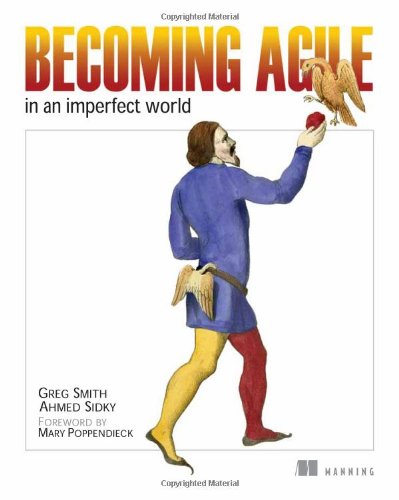

Most ebook files are in PDF format, so you can easily read them using various software such as Foxit Reader or directly on the Google Chrome browser.
Some ebook files are released by publishers in other formats such as .awz, .mobi, .epub, .fb2, etc. You may need to install specific software to read these formats on mobile/PC, such as Calibre.
Please read the tutorial at this link. https://ebooknice.com/page/post?id=faq
We offer FREE conversion to the popular formats you request; however, this may take some time. Therefore, right after payment, please email us, and we will try to provide the service as quickly as possible.
For some exceptional file formats or broken links (if any), please refrain from opening any disputes. Instead, email us first, and we will try to assist within a maximum of 6 hours.
EbookNice Team

Status:
Available4.5
20 reviews
ISBN 10:1933988258
ISBN 13: 9781933988252
Author: Greg Smith, Ahmed Sidky
Many books discuss Agile from a theoretical or academic perspective. Becoming Agile takes a different approach and focuses on explaining Agile from a case-study perspective. Agile principles are discussed, explained, and then demonstrated in the context of a case study that flows throughout the book. The case study is based on a mixture of the author's real-world experiences.
Becoming Agile also focuses on the importance of adapting Agile principles to the realities of your environment. In the early days of Agile, there was a general belief that Agile had to be used in all phases of a project, and that it had to be used in its purest form. Over the last few years, reputable Agile authorities have begun questioning this belief: We're finding that the best deployments of Agile are customized to the realities of a given company.
Becoming Agile discusses the cultural realities of deploying Agile and how to deal with the needs of executives, managers, and the development team during migration. The author discusses employee motivation and establishing incentives that reward support of Agile techniques.
Part 1. Agile fundamentals and a supporting case study
Chapter 1. Moving to agile
Chapter 2. The story of Acme Media
Part 2. Getting started
Chapter 3. Are you ready for agile?
Chapter 4. The fitness test: all about readiness assessments
Chapter 5. The importance of obtaining executive support
Chapter 6. Improving buy-in by creating a core team
Chapter 7. The mindset of an agile leader
Chapter 8. Injecting agility into your current process
Chapter 9. Selecting a pilot project
Part 3. Kicking off
Chapter 10. Feasibility: is this project viable?
Chapter 11. Aligning the pilot team with the project
Part 4. Populating the product backlog
Chapter 12. Feature cards: a tool for “just enough” planning
Chapter 13. Prioritizing the backlog
Chapter 14. Estimating at the right level with the right people
Part 5. Enough information for scheduling
Chapter 15. Release planning: envisioning the overall schedule
Chapter 16. Iteration planning: the nitty-gritty details
Part 6. Building the product
Chapter 17. Start your engines: iteration 0
Chapter 18. Delivering working software
Chapter 19. Testing: did you do it right?
Part 7. Embracing change
Chapter 20. Adapting: reacting positively to change
Chapter 21. Delivery: bringing it all together
Chapter 22. The retrospective: working together to improve
Part 8. Moving forward
Chapter 23. Extending the new process across your company
Appendix A. Readiness assessment tables by practice
Appendix B. Agile concepts from a phase perspective
Appendix C. Agile process overview in text
Appendix D. Example: determining process and document needs for a project
Appendix E. Quantitative feedback on the SAMI
becoming agile ...in an imperfect world
xp is an agile development method
xp agile practices
4 values and 12 principles of the agile manifesto
Tags: Greg Smith, Ahmed Sidky, imperfect world